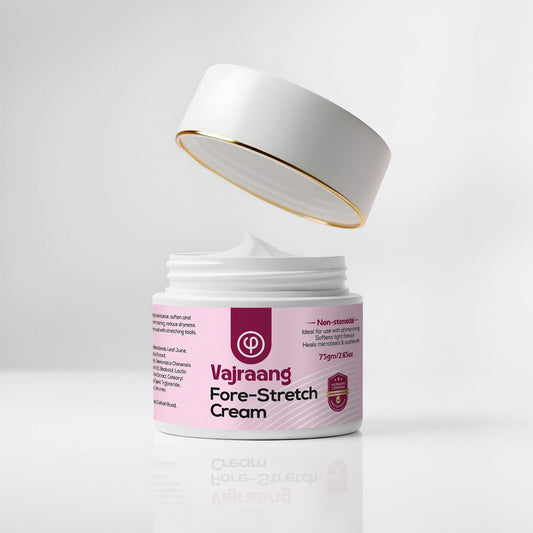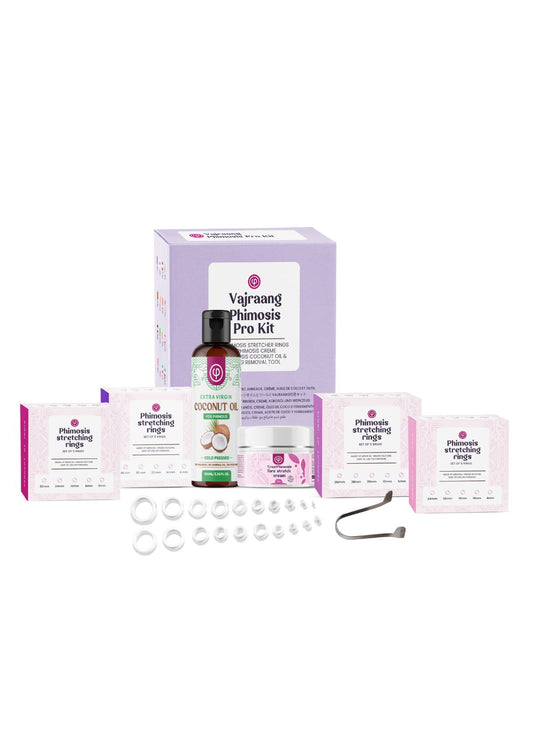Phimosis treatment and intimacy require careful practices to avoid setbacks like paraphimosis and tears. Paraphimosis occurs when a tight foreskin retracts behind the glans and becomes stuck, causing pain, swelling, and restricted blood flow—requiring immediate medical attention. Microtears, on the other hand, result from overstretching, leading to scarring and complications.
By using gradual stretching techniques, proper lubrication, and caution during sexual activity, these issues are entirely preventable. Here’s how to ensure a safe and successful journey:
What Is Paraphimosis, and Why Does It Happen?
Paraphimosis occurs when the phimotic band gets trapped behind the glans.
Common Causes
1. Forceful Retraction: Pulling the foreskin back too quickly.
2. Sexual Activity: Vigorous motion during intercourse or masturbation.
3. Improper Use of Rings: Using the wrong size or stretching too aggressively. Learn more about proper technique in “How to Use Vajraang Phimosis Stretching Rings for Treating Phimosis at Home”.
Risks of Microtears During Treatment
Stretching too forcefully can result in tears that may seem minor but cause:
• Scarring: Making the skin less elastic and harder to stretch.
• Increased Tightness: Worsening phimosis over time.
• Pain or Infection: Open wounds are prone to complications.
For advice on avoiding microtears, read “Do This If You Experience Pain During Stretching”.
How to Prevent Paraphimosis and Tears
1. Gentle, Gradual Stretching Techniques
• Be Consistent, Not Forceful: Regular, gentle stretching is more effective than pushing beyond your limits. Tools like Vajraang Phimosis Stretching Rings apply consistent pressure safely.
• Use the Right Size: Start small and progress only when the current size feels loose.
• Lubricate Generously: Apply Vajraang Extra Virgin Coconut Oil to minimize friction and prevent tears.
2. Precautions During Sexual Activity
• Use Condoms: Reduce direct friction and limit excessive retraction.
• Lubricate Both Partners: Ensures smooth, controlled movements.
• Avoid Sudden Movements: Keep a slow and steady pace during intimacy.
3. Watch for Warning Signs
• Pain or Resistance: Stop immediately if discomfort occurs.
• Swelling or Redness: Address irritation early with rest and hygiene.
4. Handle Tears Properly
If a tear occurs:
• Clean Gently: Use warm water without harsh soaps.
• Apply Soothing Ointments: Aloe vera or Vajraang Extra Virgin Coconut Oil can promote healing.
• Pause Stretching: Let the area recover before resuming treatment.
What to Do If Paraphimosis Occurs
1. Act Quickly: Delays worsen swelling and discomfort.
2. Manual Reduction: Lubricate and gently reposition the foreskin over the glans. Ice can reduce swelling beforehand.
3. Seek Medical Attention: If unsuccessful, consult a doctor immediately. For guidance, read “When to Seek Medical Advice for Phimosis”.
Why Prevention Matters
Avoiding complications ensures smoother progress in both treatment and intimacy. By practicing patience, proper techniques, and awareness, you protect yourself from setbacks like tears or paraphimosis.
Final Thoughts
Preventing paraphimosis and tears comes down to respecting your body’s limits and progressing gradually. Whether treating phimosis or engaging in intimacy, prioritizing safety ensures a comfortable journey toward full foreskin mobility.
With the right tools, techniques, and care, your path to freedom is achievable—confidently and without risk.






